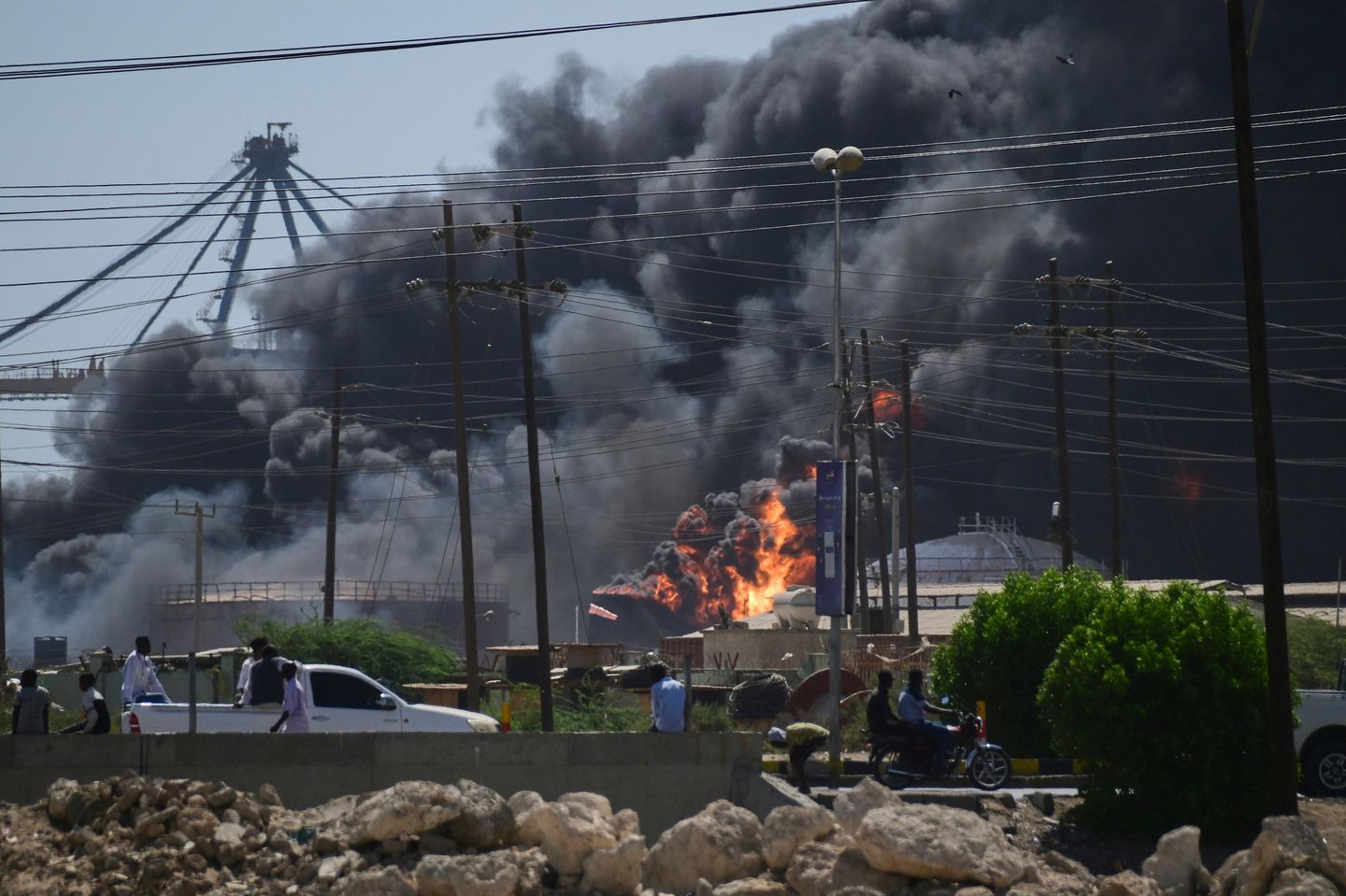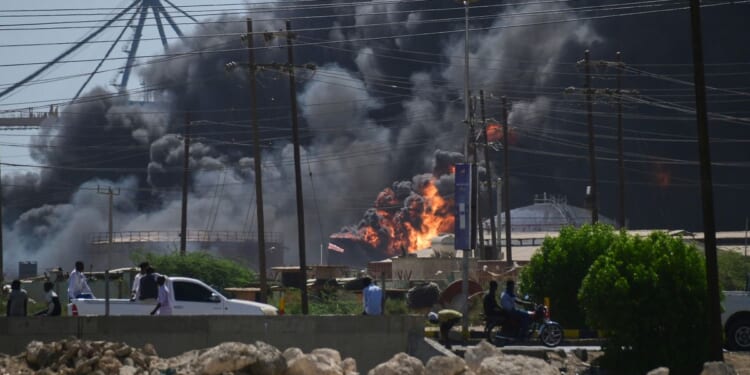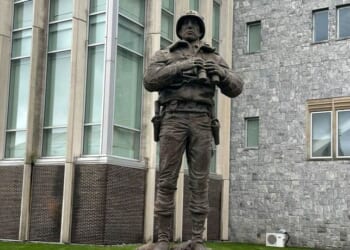
ISTANBUL — Sudan’s civil war has opened the door to expanding Iranian influence in Africa and is posing an increasingly dire threat to the new U.S.-backed military and economic order that the Trump administration is trying to build, nation by nation, across the Middle East.
The Rapid Support Forces’ October capture of the city of El Fasher has pulled Iran, the United Arab Emirates, Saudi Arabia, Egypt, Turkey and Israel into a proxy contest that intelligence officials say could reshape the Red Sea’s balance of power. The RSF, the former Sudanese government’s paramilitary army, is estimated to have 100,000 men.
Two militaries, the RSF and the rival Sudanese army, have battled for control of the resource-rich country since both groups worked together to stage a coup in 2023.
Both sides have been accused of atrocities, but the reports of mass killings, rapes and kidnappings blamed on the RSF that have emerged since the militants took control of El Fasher, the capital of the western Sudanese state of North Darfur, have stunned the world.
On Wednesday, President Trump signaled that he intends to get involved in ending the fighting. The top U.N. humanitarian official called the region controlled by the RSF a “crime scene.” On Thursday, the European Union imposed new sanctions on the RSF.
The United Arab Emirates, a key U.S. ally in the Middle East, has been accused of funding and arming the RSF. The Sudanese army increasingly has come to rely on weapons from Iran, setting up a complex proxy fight between Iran and the U.S. and its allies, which are trying to find a morally defensible middle ground between the two armies.
Iran’s military relationship with Sudan’s regular army has grown as the RSF has obtained more sophisticated European and Russian arms.
Drone shipments, precision-guided munitions and Iranian technicians now operate in army-controlled territory, giving new capabilities to the head of the Sudanese army, Gen. Abdel Fattah al-Burhan.
The UAE’s support for the RSF, led by Gen. Mohamed Hamdan Dagalo, known as Hemedti, has produced an unusual alignment: Iran, Saudi Arabia, Egypt and Turkey backing the state military. Meanwhile, Abu Dhabi arms a militia that the State Department has determined committed genocide in Darfur.
Massad Boulos, Mr. Trump’s Africa envoy, told AFP in Doha on Saturday that the atrocities in El Fasher “are absolutely unacceptable.” He called the conflict “the world’s biggest humanitarian crisis” and urged both sides to accept an immediate three-month humanitarian truce. “We’ve all seen those videos. We’ve seen those reports. This must stop very quickly,” he said.
Neither side has committed to stopping the fighting.
Haim Koren, former Israeli ambassador to Egypt, said Sudan’s location makes Iran’s resurgence impossible to ignore.
“Normalization with Sudan [by Israel] was never symbolic. It was strategic,” Mr. Koren told The Washington Times. “The country sits on the gateway to Africa, controlling a vital corridor for weapons, smuggling and trade.”
Until 2015, when Sudan severed ties with Iran to join the Saudi-led coalition in Yemen, Tehran used the African nation’s Red Sea coast to move arms to the Gaza Strip and Lebanon. The civil war there now presents Tehran with an unexpected opportunity.
“Burhan’s people asked us repeatedly for weapons, saying, ‘If you don’t help us, we’ll go to the devil,’” he said. “When we refused, they renewed ties with Iran — literally one day after Oct. 7. What followed was not one shipment but a deliberate Iranian strategy to deepen its presence on the Red Sea.”
Sudan’s 530-mile coastline makes it the only Red Sea state where Iran can operate without U.S., Saudi or Israeli naval pressure.
Analysts say this creates an alternative corridor for Tehran to reinforce the Houthis’ maritime campaign, which has threatened global shipping since late 2023.
Iran International, a Saudi-backed Persian-language outlet, reported that Sudan offers Tehran an opportunity to regain access to African ports and expand its influence on both sides of the Red Sea.
Israel’s Institute for National Security Studies has likewise warned that Sudan could once again become a transit point for Iranian arms transfers to Hamas and Hezbollah.
Behnam Ben Taleblu, an Iran specialist at the Foundation for Defense of Democracies, said Tehran is “doubling down on the Houthis while rebuilding ties in Africa,” with Sudan emerging as a key part of that network.
Saudi officials see these developments as a direct challenge to their Red Sea ambitions. The kingdom’s economic transformation relies on shifting oil ports and tourism infrastructure to its western coast, reducing reliance on the Strait of Hormuz. A durable Iranian foothold in Sudan would place Tehran across from Saudi Arabia’s most sensitive economic zone.
Gen. Burhan’s government rejects claims that it has become an Iranian client.
“There was one shipment of weapons that the Sudanese government bought legally from Iran. Government-to-government. Legal. Announced,” said Amgad Fareid Eltayeb, executive director of Fikra for studies and development and a former adviser to the U.N. mission in Sudan.
“Sudan bought weapons from Turkey, Ukraine, Pakistan — anyone willing to help fight the RSF. If the West won’t support, they cannot blame Sudan for seeking alternatives,” he told The Times.
Most of the talk about “Iran colonizing Sudan” comes from Emirati messaging, he said. “There is no ideological alliance between Sudan and Iran. It’s survival. Sudan is not becoming an Iranian satellite.”
While Iran backs the formal Sudanese state, the UAE remains committed to the paramilitary RSF.
Raphael Parens, who authored a 2024 study on the UAE’s military footprint in Africa, said Sudan fits a wider Emirati pattern. “In Sudan, [UAE support] includes backing a militia that is committing what many observers describe as genocide in Darfur,” Mr. Parens told The Times.
The UAE uses contractors, gold smuggling networks, foreign fighters and covert airlifts to project influence without deploying troops, a model applied in Libya, Yemen and the Central African Republic.
Kholood Khair, a Sudanese political analyst and founding director of Confluence Advisory, speaking from Nairobi, said the war has become “deeply ethnicized,” with civilians backing “whichever armed group they believe will hurt them least.”
Abu Dhabi has not publicly acknowledged arming the RSF, but a senior Emirati official signaled unease with the war’s trajectory. Speaking at the Manama Dialogue in Bahrain earlier this month, Anwar Gargash, diplomatic adviser to the UAE president, said the international community “made a mistake” by failing to oppose the 2021 military coup that ended Sudan’s transition to civilian rule. “Looking back, that was a critical mistake. We should have put our foot down, all of us, collectively,” he said.
Western intelligence reporting indicates that the Russia-based Wagner Group has facilitated Emirati weapons transfers to the RSF via Chad and the Central African Republic.
Sudan ranks among the world’s top producers of gold, oil, gum arabic, sesame and peanuts, thanks to its fertile land along the Nile. The fight over that wealth is fueling the war. Egypt, the UAE and Saudi Arabia had used Sudanese land for food production.
Egypt, Saudi Arabia, Iran and Turkey all support the Sudanese army despite deep ideological, sectarian and geopolitical rivalries.
Egypt sees an RSF victory as a direct threat to its southern border and the Nile corridor. Saudi Arabia fears Iranian influence on the Red Sea but views the RSF as too closely tied to Emirati adventurism. Turkey seeks commercial access to Red Sea ports and sees the Sudanese Armed Forces as the most reliable institutional partner.
“The split between Riyadh and Abu Dhabi over Sudan is real,” Mr. Eltayeb said. “Saudi Arabia wants stability on the Red Sea. The Emirates want leverage through ports, gold and proxies.”
“Iran, Saudi Arabia, Egypt, Turkey — they share no ideology,” he said. “What they share is survival and practicality. They don’t want a militia controlling the Red Sea.”
Sudan’s ties with Iran emerged “because no one else would give them weapons,” said Ms. Khair, noting that the shift occurred “with Saudi acquiescence” after Riyadh’s detente with Tehran.
Russia and China have avoided taking sides and prioritized safeguarding their commercial interests instead. Russia’s Wagner Group initially supported the RSF’s Gen. Hemedti but shifted its alignment as Moscow pursued access to Port Sudan in coordination with Tehran. China maintains ties with both factions to protect mining concessions and infrastructure investments.
“Sudan has become a battlefield for global power competition,” Mr. Eltayeb said. “Iran, Russia, China, Turkey, the UAE, Egypt — all of them are involved in one way or another.”
Control of Sudan’s ports and coastline could reshape the balance of power across the Red Sea, a corridor central to U.S. interests, Israeli security and Saudi Arabia’s economic strategy.
“Red Sea geopolitics are being superimposed onto Sudan’s internal conflict,” Ms. Khair said. “That combination is creating a behemoth that will be very difficult to stop.”
Outside powers may believe they are shaping Sudan’s future, but the war is restructuring the region around them. “If the Red Sea becomes a front line between competing blocs,” she said, “Sudan won’t be the only country pulled under.”











